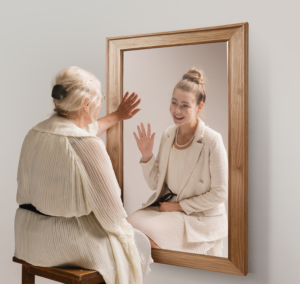
By Mikelann Valterra
I’ve asked clients over the years to envision themselves in twenty years. What about you? Can you do this? The truth is, we struggle with imaging ourselves in the future. But the ability to envision ourselves in the future has the single greatest impact on our financial behavior and in particular our ability to save. Herein lies a big problem—did you know that the part of the brain you use to think about yourself is a different part of the brain than you use to think about other people? AND– when you think about who you will be in the future, be it five years or twenty, the part of the brain that activates is the part that thinks about other people.
It is as if you are thinking about someone else. Not you.
Because we struggle with seeing ourselves in the future, we struggle with taking care of the person we will be in the future.
Our brains tell us that it is not us, it is someone else. So why sacrifice for this “other” person? Saving money for retirement or future dreams and goals involves spending less money now. Boring! And I would rather buy the shoes and go on vacation. Why spend less so I can save more money for “her”?
So, feeling good about saving money first involves spending time getting to know your future self. But how can you get to know this person?
Try this exercise: Write out what an ideal day may look like for you in twenty years. Where do you live? Who is around you? What do you hear and see? What are you wearing? Spend time describing the environment that you may enjoy being in, in the future. Then write about what the future you may be doing. What are you hoping you/she will have time for?
Some financial therapists recommend using aging software to get a picture of what you may look like in the future, so you can really befriend your future self. Be careful with this, as this is helpful to some and upsetting to others. If it might motivate you—connect you better to her– then do it.
Another exercise: write your future self a letter and ask her for advice about money. Then have her write a letter back to you. What do you imagine she may share or ask you to do, or stop doing, that would take better care of her? This is about growing and nurturing this relationship with the future you. You can talk with her.
The other issue with thinking about our future selves is that you don’t always know what you are saving for. The future, by definition, is unwritten. We are saving for things that haven’t happened yet. What emergency might happen that will require you/her to use your/her safety net savings? (So that you protect your investments.) What lifestyle will you/she want to have in the future that is different now? Savings gives you and her options.
If you do not take care of your future self, who will? Your future you will want freedom. Savings protects her freedom.
Consider brainstorming a list of possible actions you could take that would help take better care of the future you.
Then go back and pick one idea to implement. Here are some ideas that could help:
- Increase your IRA/ 401k contributions by 3%
- Pay down your debt so she does not have any debt payments
- Beef up your safety net so she can use it and avoid tapping her investments at the wrong time (in case another pandemic affects her…)
- Hire a money coach to learn how to handle money (I couldn’t resist adding that one!)
- Take action to provide her future rental income
- Increase your mortgage payment to help her be mortgage free sooner.
And yes, this same idea applies to health. My future self wants me to floss every day, since she hates dental procedures and wants me to do more to protect her from dental problems. My future self also wants me to continue building a strong core, so she is back-pain free. I go to the gym for her, as well as for me.
Get to know and love your future self. She is counting on you. You are in the best position to take care of her. Love her up!
(Email me back with your ideas of possible things you can do for her. I would love to see more ideas.)
And in fact, we struggle so much with seeing ourselves in the future that when we finally manage to envision her, we assume she is not that different from who we are today. Is this true? More on that in my next newsletter.


this was a great article thanks
Beautifully written and very inspiring. Thank you!